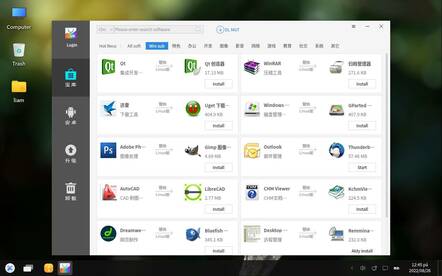Introduction: A Tale of Two Distributions

In the realm of Linux distributions, Ubuntu stands as a prominent figure, renowned for its user-friendliness, extensive software repository, and robust community support. However, not all distributions are created equal. While Ubuntu caters to a broad global audience, Ubuntu Kylin emerges as a tailored variant specifically designed with Chinese users in mind. In this comprehensive analysis, we delve into the intricate details distinguishing these two distributions, unveiling their respective strengths and potential drawbacks. Our aim is to guide Chinese users toward the optimal choice based on their specific needs and preferences.

A Swift Glance at Ubuntu Kylin’s Tailored Features

Ubuntu Kylin proudly boasts an impressive array of features customized to enhance the computing experience for Chinese users. These meticulously crafted features include:
-
Language Support: Ubuntu Kylin seamlessly integrates the Chinese language throughout its user interface, applications, and documentation, ensuring a cohesive and familiar experience for users.
-
Input Methods: Recognizing the importance of input methods for Chinese characters, Ubuntu Kylin incorporates a diverse selection of input methods, including pinyin, wubi, and handwriting recognition, empowering users with the flexibility to choose their preferred input style.
-
Chinese-Specific Software: Ubuntu Kylin comes pre-installed with an array of Chinese-specific software, such as Sogou Pinyin, an input method known for its proficiency in Chinese character recognition, and Youdao Dictionary, a comprehensive dictionary with vast Chinese definitions and exemplary sentences. These pre-installed applications cater to the everyday needs of Chinese users, enhancing productivity and facilitating seamless communication.
Additional Considerations for the Discerning User
Beyond the aforementioned features tailored specifically for Chinese users, several other differentiating factors may influence the distribution choice. These considerations include:
-
Software Availability: Ubuntu Kylin maintains its own software repository, distinct from the primary Ubuntu repository. This curated repository houses a repository of Chinese-specific software packages, ensuring compatibility with the distribution’s native applications. However, users may encounter instances where certain popular software applications are not available in the Ubuntu Kylin repository.
-
Unique Interface: While Ubuntu Kylin shares the same underlying foundation as Ubuntu, its user interface exhibits unique visual elements and design choices, catering to the aesthetic preferences of Chinese users. These variations extend to the desktop environment, application icons, and system themes, contributing to a cohesive and distinct user experience.
-
Community Involvement: Ubuntu Kylin actively fosters a thriving community dedicated to providing support, documentation, and ongoing development. This dedicated community serves as a valuable resource for Chinese users seeking assistance or desiring to contribute to the distribution’s betterment.
Navigating the Crossroads: A Recommendation for Chinese Users
Having explored the distinctive attributes of Ubuntu and Ubuntu Kylin, we can now provide tailored guidance to Chinese users seeking an optimal distribution:
-
If you prioritize a seamless and culturally familiar computing experience with extensive Chinese language support, input methods, and pre-installed Chinese-specific software, Ubuntu Kylin emerges as the compelling choice.
-
For users seeking a broader software selection, a more extensive community, and a greater degree of customization, Ubuntu presents itself as the superior option.

This was a very interesting post. I enjoyed reading it and learning more about Ubuntu Kylin.
I was not impressed with this post. I found it to be poorly written and uninformative.
This post was very informative. I learned a lot about Ubuntu Kylin.
I disagree with the author’s opinion that Ubuntu Kylin is the best for Chinese users.
Great post! I’m sure this will be very helpful to Chinese users.
This post is a joke! Ubuntu Kylin is not the best for Chinese users.
This is by far the best, most in-depth piece I have read on Linux distributions geared towards Chinese users.
While this post offers some valid points about Ubuntu Kylin, there are a few crucial topics it fails to address, like hardware compatibility and software support.
The author makes a compelling case for Ubuntu Kylin’s advantages for Chinese users, but it would be more persuasive if it included comparative benchmarks against competing distributions.
Roundly applauding this post for shedding light on a niche area in the Linux ecosystem! Ubuntu Kylin deserves more recognition.
While I appreciate the author’s enthusiasm for Ubuntu Kylin, it’s important to consider that user preferences can vary widely, and there’s no ‘one-size-fits-all’ solution when choosing a Linux distribution.
It’s rather surprising that the post overlooks the limitations of Ubuntu Kylin’s software ecosystem, which can be a major factor for users who rely on specific applications.
While Ubuntu Kylin certainly has its merits, it’s worth noting that Deepin, another Linux distribution tailored for Chinese users, offers a visually appealing and user-friendly experience.
Behold, the ultimate solution for Chinese Linux users: Ubuntu Kylin, the distribution that promises to make your computer speak fluent Mandarin!
For those who prefer their Linux with a side of dumplings, Ubuntu Kylin is the perfect choice!